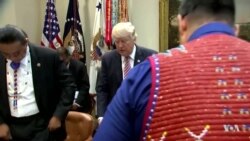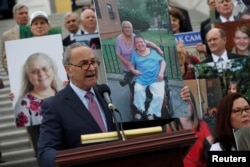Senate Republicans are working to revive efforts to pass a health care overhaul bill, a key pledge they made with then-candidate Donald Trump during last year's presidential election campaign.
Trump suffered a political setback when Senate Republican leaders put off a vote on a health care bill after it was clear they could not bridge the divide between moderates and conservatives. Senate Majority Leader Mitch McConnell had pushed for a vote this week, but has delayed the effort until after the July 4 holiday recess.
Trump: 'Very tough'
Despite the delay, Trump maintains he is committed to his campaign pledge to repeal and replace President Barack Obama's signature health care law, known as Obamacare, although he acknowledged it could be "very tough."
"We are looking at a health care that would be a fantastic tribute to our country, a health care that would take care of people, finally, for the right reasons and also at the right cost," Trump said at a White House meeting. It was necessary to act, he added, because "Obamacare is melting down."
The decision to put off the vote came amid protests at the Capitol and in the face of a united front of opposition put forward by Senate Democrats.
Watch: High Stakes for Trump in Republican Stumble Over Health Care
Schumer: 'Rotten at the core'
Senate Democratic leader Chuck Schumer said the Republican proposal was "rotten at the core" and noted recent polls that show support for the Republican bill has plummeted.
"The American people are not for big tax breaks to the wealthiest of Americans, nor are they for dramatically cutting their health care," Schumer told reporters at the Capitol. "That's why the bill has about 17 percent popularity in America and even Trump voters don't like it."
Several recent polls show the bill with approval ratings of below 20 percent, and that has fueled rumblings of political concern among many Republicans in the Senate and widened the divide between moderates and conservatives.
Republican split
Moderates worry that Republicans will be held politically liable if millions of Americans lose their health insurance coverage. The nonpartisan Congressional Budget Office projected that figure could rise to 22 million people over a 10-year period.
"I don't think there is any doubt that if this legislation were to become law, there would be very large reductions in the number of people with insurance coverage," said Matthew Fiedler, an expert on health care policy with the Brookings Institution in Washington. "My personal view is that would ultimately have serious political consequences for Republicans down the road."
Conservative Republican senators are eager to follow through on the promise of a complete rollback of Obamacare, a core demand that has united the party for the past seven years.
"Obamacare is a bus that is going off a cliff," said Republican Senator John Barrasso of Wyoming. "Democrats are saying, 'Stay on board.' We are trying to rescue the American people from this bus that they are on."
A generation of debate
Spending on health care represents about one-sixth of the U.S. economy, and political efforts to reform the system have confounded both parties for a generation. Former President Bill Clinton launched a major effort in 1993, led by then-first lady Hillary Clinton, only to be blocked once Republicans won control of Congress the following year.
Democrat Obama made health care reform a central part of his 2008 presidential campaign, and as president, he signed what become known as his signature legislative achievement in 2010. That, in turn, fueled the rise of Tea Party activists around the country, which helped Republicans win back control of both the House of Representatives and the Senate.
Now it is President Trump and the Republicans in Congress who will be held to account by their voters beginning in next year's midterm congressional elections and the presidential race in 2020.
"We want to see whether voters feel that President Trump has lived up to his hype and expectations and whether or not he has been able to keep his promises," said Emory University political scientist Andra Gillespie.
Trump and his Republican allies in Congress have been counting on a major deficit savings from the health care bill to set up their next big priority: tax reform.










